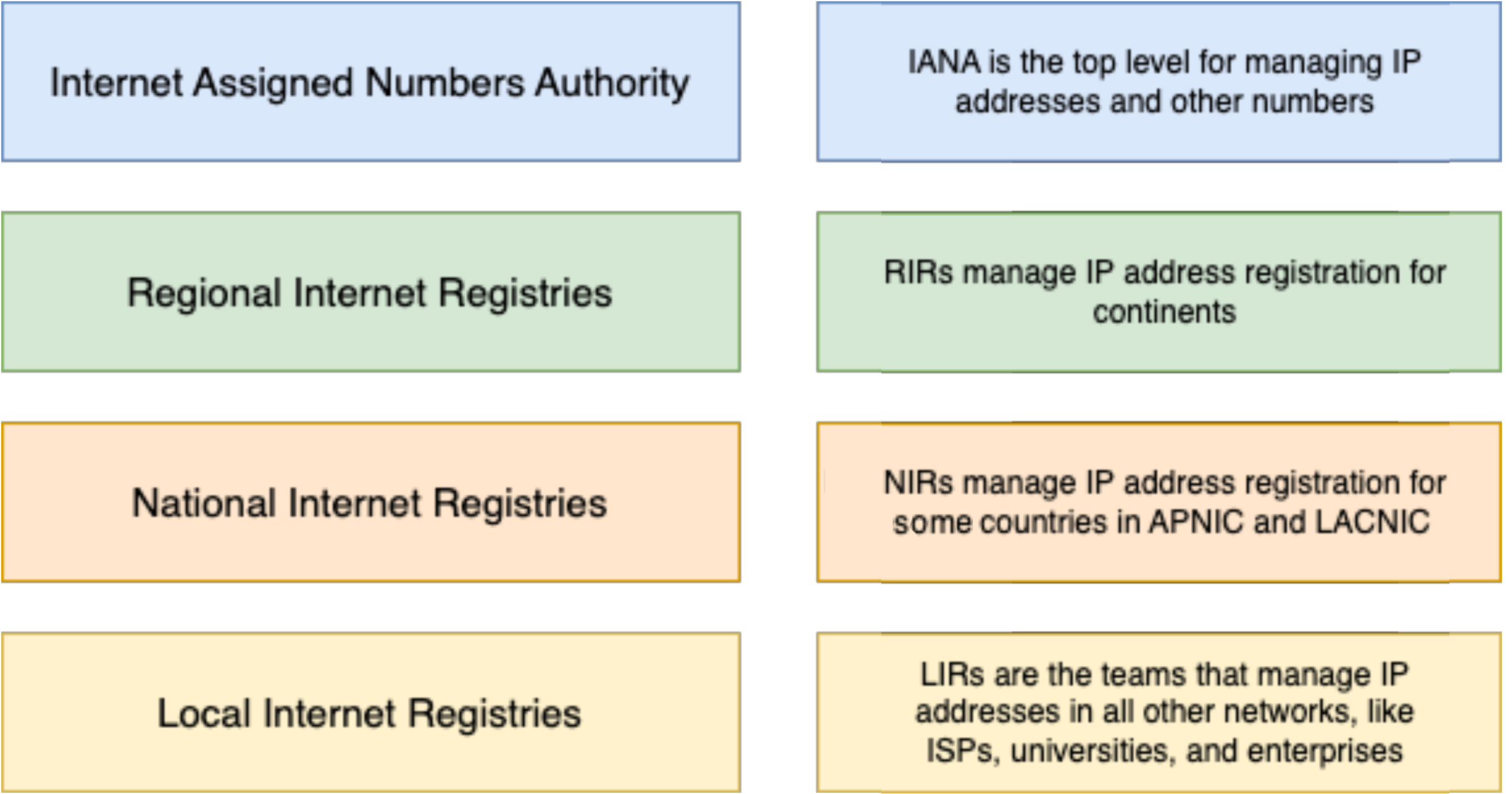Legacy IPv4
What Is It and Why Care?
by Leo Vegoda

Until you have a postal service, street names and addresses are a convenience. But when everyone can mail letters, an administration must make each location unique.
When the internet was still the ARPANET, Jon Postel did this for all sorts of unique identifiers used for computer networks. IPv4 addresses were a part of this, but he also managed port assignments, and the creation of Top-Level Domain names, like .com.
These addresses were issued before the development of community governance for IP addresses. The organizations using these addresses did not have to implement the new policies. Most importantly, they did not have to return any surplus addresses.
How is IP address space distributed now?
“Managing” IP address space essentially means distributing it and recording who is using those addresses. IP address space is now managed in a hierarchical manner. The top level of all internet number registries is managed by IANA, a small specialist organization based in Los Angeles. They delegate IP addresses, including responsibility for onward distribution, to other organizations, who delegate onwards until we get to network operators.

The hierarchy of IP address delegation.
Why does legacy IPv4 space exist?
Postel did not directly issue all the IPv4 addresses himself during the early years. The internet’s rapid success required overseas help. And as the internet started to grow in Europe and Asia, local people distributed addresses and kept records. This meant that people could coordinate with the registry in their own language and time zone.
The Regional Internet Registries (RIRs) emerged in the early 1990s but weren’t mature legal entities until the end of the decade. AFRINIC, the last RIR formed, achieved recognition in 2005.
National Internet Registries were instrumental in the development of the RIRs. They continue to play a vital role in localizing the delivery of services to populations that don’t speak the dominant language in their region. This includes transfers in and out of those regions. JPNIC, serving Japan, and NIC.BR, serving Brazil are key examples.
The policy-making function for the allocation of addresses started to move away from IANA in the mid-1990s. In 1993, the Guidelines for Management of IP Address Space was published. It recommended that RIRs should be “committed to allocate IP numbers according to the guidelines established by the IANA and the IR.”
That changed by 1996, when new guidelines were published. These were developed by the RIRs and their communities. The new guidelines recognized the introduction of technologies that improved address usage efficiency.
And the legal basis for allocation changed when the operator community created the RIRs. The creation of the RIRs involved the development of a policy and legal framework. Companies entered contracts and agreed to policies.
How is it different from RIR issued space?
The new community policies were not retrospectively imposed on those who already had addresses. Many organizations found they had much more address space than they actually needed.
Improvements in routing technology meant that they could use their addresses more efficiently. Suddenly, they had a surplus. And importantly, they were under no agreed-upon requirement to return addresses to the registry.
Each RIR treats these legacy or historical allocations differently.
AFRINIC
Legacy resource holders do not have access to the MyAFRINIC portal, or services like DNSSEC and RPKI. Resources lose their legacy status when transferred.
APNIC
In 2021, APNIC decided that everyone with historical resources would need to contract with APNIC. It is now reviewing every historical resource. It will reclaim unused addresses for future allocation.
Contracting with APNIC means that historical resource holders have access to all of APNIC’s services, including RPKI. Resources lose their legacy status when transferred.
ARIN
ARIN has been encouraging legacy resource holders to sign a tailored contract with it since 2008. Registrants without a contract continue to get the basic services but can’t get new services, like RPKI or use ARIN’s Internet Routing Registry (IRR).
Resources lose their legacy status when transferred.
Registrants that signed its tailored contract before the end of 2023 got a fee cap. Those who sign up now won’t get that benefit. But they could choose to transfer their resources to the RIPE NCC and contract with them instead.
LACNIC
LACNIC offers all services to legacy registrants but they lose their legacy status if they are transferred.
RIPE NCC
The RIPE NCC requires the least from legacy registrants. It will continue providing the services the registrant already has but does not need to offer new services, like RPKI. No contractual agreement is required. The registrant may contract with the RIPE NCC or a Local Internet Registry in its own country if it prefers. Contracting gives the registrant access to RPKI services.
The RIPE NCC recognizes the legacy status of historical resources transferred to its region. The RIPE NCC has a dedicated legacy resources FAQ.
What value does legacy status hold?
The key value of legacy status is the ability to take advantage of basic registration services without charge. RIR services for non-legacy registrants incur an annual fee.
2024 fee for a legacy /16 (65,536 addresses)
| Fee | USD equivalent | |
| AFRINIC | USD $1,4631 | $1,463 |
| APNIC | AUD $10,2342 | $6,750 |
| ARIN | USD $4,000 | $4,000 |
| LACNIC | USD $600 | $600 |
| RIPE NCC | EUR €1,550 | $1,675 |
1Non-member fee. The fee charged to Local Internet Registry members is higher.
2A discount is available to registrants in UN designated Least Developed Countries
What negatives exist?
Internet network operators are paying more attention to routing security. Not having access to RPKI services is likely to be a problem for some networks in the future. Bringing your own IP addresses (BYOIP) to a cloud service, like AWS, must be done using an RIR’s RPKI service.
Not having access to ARIN’s IRR will be a problem for networks that want to change the way they route their addresses on the internet.
IRR registration and RPKI reduce the risk of misconfigurations in other networks causing routing problems for your network.
How can IPv4.Global help?
If you have surplus legacy IPv4 addresses, we can help you realize their value. IPv4.Global has brokered over $1 billion in sales. We operate the most transparent auction platform and can negotiate private deals. Contact us at info@ipv4.global for a chat about how we can help you.